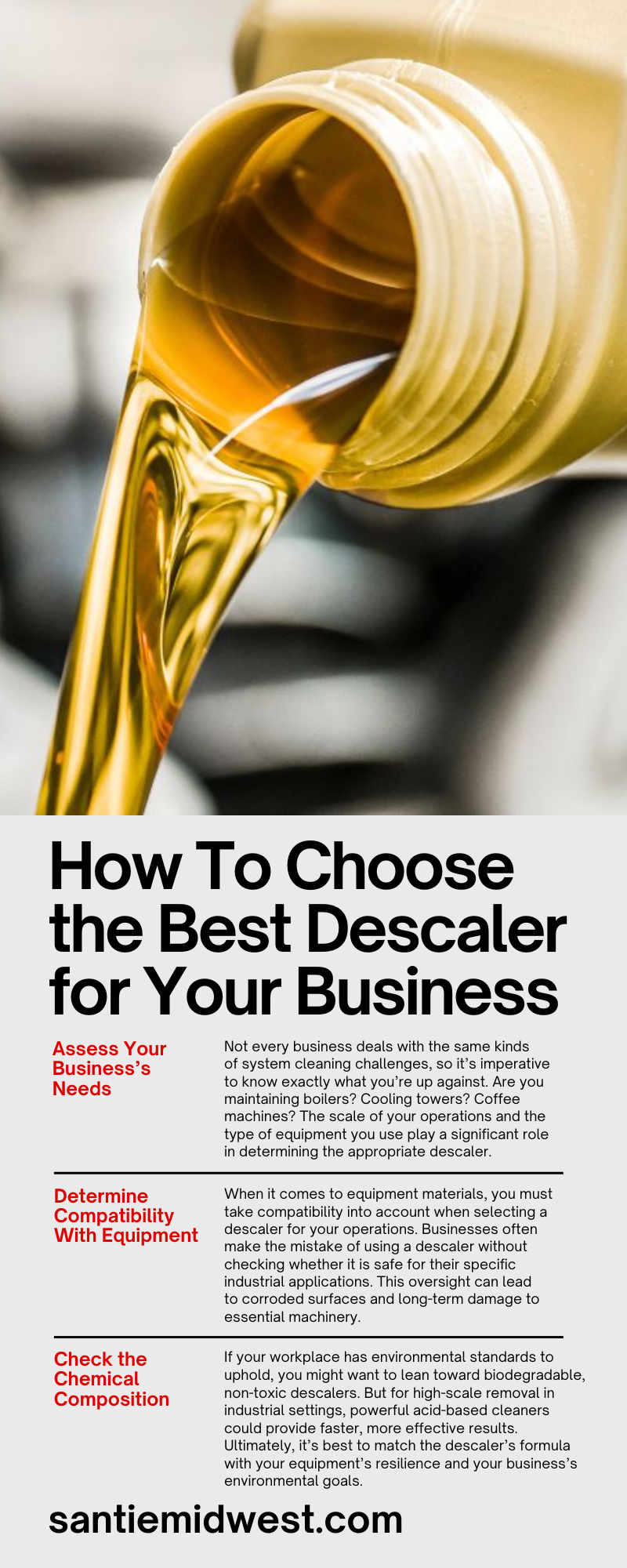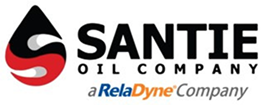A clean, efficient system is the backbone of any successful business operation, but hard water buildup, limescale, and mineral deposits can wreak havoc on equipment, driving down performance and escalating costs. This is where descalers come in, saving the day one piece of machinery at a time. However, manufacturers don’t make all descalers the same, and choosing the wrong one could leave you worse off than when you started.
If you’ve been wondering how to choose the best descaler for your business, you’re in the right place. This guide unpacks everything you need to know—from chemical compositions to compatibility considerations—so you can make a good decision that keeps your operations running smoothly.
Understand the Types of Descalers Available
When it comes to descalers, the first thing you need to know is that there are different types available on the market. Some are acid-based and contain powerful agents like hydrochloric or phosphoric acid, which are perfect for dissolving even the toughest mineral deposits. Meanwhile, biodegradable and eco-friendly descalers cater to businesses aiming to reduce their environmental impact. Other descalers fall into neutral pH categories, which means they provide a gentler alternative for sensitive equipment.
Choosing the right type of descaler depends on your specific needs. If you’re dealing with heavily calcified systems, for instance, an acid-based product might be your best bet. However, if your business focuses on sustainability, you might lean toward greener options that don’t sacrifice cleaning power. Understanding what your business prioritizes will help you narrow down the choices significantly.
Assess Your Business’s Needs
Not every business deals with the same kinds of system cleaning challenges, so it’s imperative to know exactly what you’re up against. Are you maintaining boilers? Cooling towers? Coffee machines? The scale of your operations and the type of equipment you use play a significant role in determining the appropriate descaler.
You must also identify how frequently scale buildup occurs and how severe it gets. If buildup happens quickly, you might require a more aggressive solution. On the other hand, a gentler product might suffice for light and periodic maintenance.
Determine Compatibility With Equipment
When it comes to equipment materials, you must take compatibility into account when selecting a descaler for your operations. Businesses often make the mistake of using a descaler without checking whether it is safe for their specific industrial applications. This oversight can lead to corroded surfaces and long-term damage to essential machinery.
Most descaler products clearly indicate what they are specifically designed to clean, whether it’s metal-based equipment, plastic components, or combinations of both. For businesses in manufacturing or food service industries, it’s especially important to choose products that protect the integrity of the equipment while remaining effective at removing buildup.
Check the Chemical Composition
Descaler labels provide you with critical information that can guide your decisions regarding descaler use. Chemical composition includes indicators of product strength, safety, and suitability for particular applications.
If your workplace has environmental standards to uphold, you might want to lean toward biodegradable, non-toxic descalers. But for high-scale removal in industrial settings, powerful acid-based cleaners could provide faster, more effective results. Ultimately, it’s best to match the descaler’s formula with your equipment’s resilience and your business’s environmental goals.
Consider Safety and Compliance
Many businesses tend to overlook how safety considerations can influence their choice of descaler. Harmful chemicals in harsher descalers can pose risks to both employees and the safety protocols within organizations. For instance, while acid-based solutions may come with significant cleaning benefits, they also require more stringent handling guidelines.
It’s also important to know whether the descaler you’re considering aligns with OSHA standards and your local compliance laws. Businesses, particularly in industries like manufacturing and healthcare, must strike the right balance between cleaning efficacy and operational safety. Safer options may leverage innovative formulations that still pack a cleaning punch but with reduced hazards.
Evaluate Cost-Effectiveness
Cost is always a factor in terms of business operations, but cutting corners with cheap, underwhelming solutions could backfire in the long run. Low-cost descalers may not offer the same level of efficiency, potentially requiring multiple applications to achieve the desired results, which adds up over time.
Instead of focusing strictly on price tags, take product value into consideration. Does the descaler last for multiple applications? Does it offer industry-proven effectiveness? A product that seems more expensive upfront might actually save you money by reducing the frequency of descaling.
Read Product Reviews
Customer reviews are an essential tool for helping you make a decision. Reviews and testimonials often reveal how a descaler performs in real-world scenarios. Look for patterns in feedback—does a particular product consistently win praise for rapid effectiveness? Does another brand have consistent complaints about residue or application complexity?
Scouring these reviews will provide you with a comprehensive look at each product’s downsides as well as its benefits, helping you choose wisely for your business’s specific needs.
Know the Frequency of Application
When choosing the best descaler, you need to consider how often you’ll use it in your cleaning schedule. Some products require more frequent use due to lower potency, whereas others might clean buildup so efficiently that repeat applications are seldom needed.
Businesses aiming to reduce operational downtime need to account for user-friendly descalers that are capable of getting the job done in a single attempt. If you know your system requires frequent cleaning, a budget-friendly yet potent descaler should be your top pick.
Identify the Right Formula for Scale Removal
Not all mineral buildup is the same. Calcium carbonate buildup often requires different formulas than systems that collect magnesium or other chemical deposits. Identifying the primary minerals forming the scale can help you find a product that specifically targets those substances.
Manufacturers design industrial descalers to handle heavy-duty applications effectively. Be aware of what your cleaning solution is intended to address to achieve the best results with minimal effort.
Make the Right Choice for Your Business
Choosing the right descaler for your business is essential to maintaining operational efficiency and preventing the need for costly repairs. By understanding your system’s unique needs and considering factors like safety and cost-effectiveness, you’ll be well on your way to consistent and effective equipment maintenance.
Trust reputable brands like Santie Oil Company to provide the items your business needs to thrive. We stock an array of specialty items, including premium descaling solutions for businesses of all sizes. Contact our team today to learn more.


